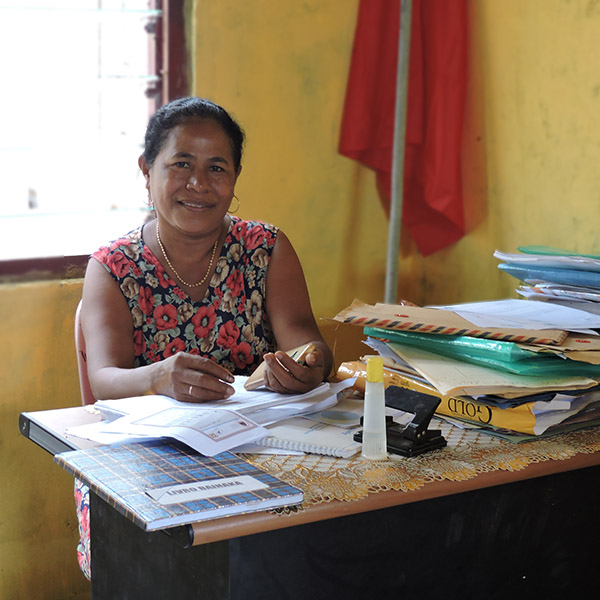Stories of Change

Ms. da Costa in her office.
Through partnership with the local government health and agriculture workers, 348 families with children under five in West Timor have improved caring and feeding practices for these children through the Timor Zero Hunger program.
Source: CWS Annual Report 2017
“CWS is the first outside organization to ever work here”
Lebucaility and Gariana are hamlets located 20 miles west of Timor-Leste’s capital city of Dili. Sometimes, though, it can feel like they are decades apart. Our team has recently begun to make the arduous journey along dirt roads to these tiny enclaves where several hundred subsistence farming families live.
Life here can be hard. Many families use traditional agricultural practices and speak a traditional language unique to Liquiçá District, which is administratively responsible for them. Many people here do not speak Tetum, the official language of Timor-Leste. Illiteracy is common here. Most families live in poverty without electricity. Water and health care services are limited. Everyone faces food insecurity.
Gabriela da Costa is the head of Vatuvou village, which includes Lebucaility and Gariana along with two other hamlets. “CWS is the first outside organization to ever work here,” she says, “and of course as village leader, I really appreciate that our national Ministry of Health has thought to suggest that our families join the Timor Zero Hunger initiative.”
The Timor Zero Hunger program started in West Timor, Indonesia (which shares an island with Timor-Leste) in 2014. Through the years, our team has helped hundreds of families change their lives for the better through sustainable responses to hunger and poverty. Conditions in the region remain quite difficult for poor families, especially since the effects of climate change – especially drought – make life here ever-perilous. Recognizing that socioeconomic and natural conditions like poverty and drought do not end at national borders, CWS is now expanding the Timor Zero Hunger program into Timor-Leste.
“I believe that the project will really help our people change their lives for the better over time – with food, better nutrition for the children, clean water and better sanitation. Right now, to get going, families will start raising chickens with support from CWS. And then another activity we are planning in line with the project is better home gardening. I think these activities will be helpful; and I understand they will be particularly good for pregnant women and young children, so I’m happy about this initiative in my community,” says Ms. da Costa.
“As we start to work together, I want to thank the CWS team for their good collaboration so far with us, community leaders, who also community members with shared hopes for all our neighbors.”
